SPI produces various publications as part of our efforts to share local findings and lessons learned with the broader Smart Policing Initiative community. Topical spotlight reports summarize findings from multiple sites focusing on similar topics or interventions. Site spotlight reports summarize sites' experiences implementing their Smart Policing Initiative projects, research findings, and lessons learned for police executives, line officers, and researchers. You can read these reports by following the links below.
Publications
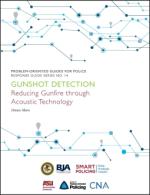
Gunshot Detection POP Guide
The Bureau of Justice Assistance (BJA) funded CNA, in partnership with the Center for Problem-Oriented Policing, to develop a series of Smart Policing Initiative (SPI) Problem-Oriented Policing (POP) Guides. The purpose of these guides is to provide the law enforcement community with useful guidance, knowledge, and best practices related to key problem-oriented policing and SPI principles and practices. The guides add to the existing collection of Problem-Oriented Guides for Police.

Tempe, AZ: The Design, Delivery, and Evaluation of Police De-escalation Training
De-escalation training has emerged as a strategy that many believe can reduce the use of unlawful and unnecessary force by police officers. Despite de-escalation’s rapid adoption in policing, its evidence base is both limited and mixed. As a result, key questions about its impact remain unanswered. In 2017, the Tempe, Arizona Police Department (TPD) and researchers from Arizona State University (ASU) received funding through the Bureau of Justice Assistance (BJA) Smart Policing Initiative (SPI) to design, deliver, and evaluate a de-escalation training program.
Topical Spotlights

Blueprint for Law Enforcement Recruitment and Retention in the 21st Century
This publication highlights important principles that law enforcement agencies need to be thinking about regarding recruitment and retention. The publication provides examples of promising practice as well as contemporary research on this topic.
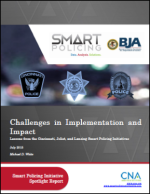
Challenges in Implementation and Impact Spotlight
This report highlights three SPI sites that have been less successful than others in documenting significant crime decreases in their targeted areas with sound research methodologies. The report describes the varied reasons why these SPI sites have struggled, which include implementation problems, data analysis issues, and leadership turnover.

Focused Deterrence of High-Risk Individuals POP Guide
This report defines focused deterrence theory, introduces the phases and core elements of focused deterrence, and discusses administering a focused deterrence initiative and applying it to specific crime problems. The report also highlights three SPI sites that have implemented focused deterrence strategies.

Retaliatory Violent Disputes POP Guide
The Bureau of Justice Assistance (BJA) funded CNA to work with the Center for Problem-Oriented Policing to develop a series of Smart Policing Initiative (SPI) Problem-Oriented Guides for Police. The purpose of these guides is to provide the law enforcement community with useful guidance, knowledge, and best practices related to key problem-oriented policing and SPI principles and practices. These guides add to the existing collection of Problem-Oriented Guides for Police.

SMART Approaches to Reducing Gun Violence Spotlight
This report highlights nine SPI sites that targeted gun violence as part of their Smart Policing Initiative. The report describes common strategies identified for implementation in the nine SPI sites, including engaging in collaboration, targeting prolific offenders, and focusing on hot spots, and the results of completed initiatives.
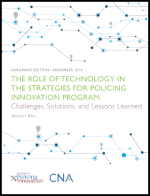
The Role of Technology In The Smart Policing Initiative Program: Hardware Edition
This report is part of a two-part series highlighting technology's role in SPI, focusing on Hardware Innovation. This report highlights three sites whose initiatives implemented hardware technologies.
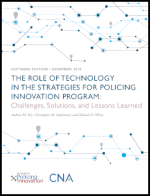
The Role of Technology In The Smart Policing Initiative Program: Software Edition
This report is part of a two-part series highlighting technology's role in SPI, focusing on software innovation. This report highlights four sites whose initiatives implemented two software technologies.
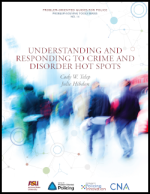
Understanding and Responding to Crime and Disorder Hot Spots POP Guide
This report defines hot spots policing, discusses the scanning phase of the SARA model, hot spot analysis, the response phase of the SARA model, and the results of prior reviews of hot spot policing literature. It also provides advice for agencies considering this form of policing. The report also highlights SPI sites that have implemented these strategies.
Site Spotlights

Boston, MA, Site Spotlight (Phase I)
This report highlights the evaluation of Boston's Safe Street Team (SST) strategy during its first Smart Policing Initiative. The report describes implementation of the hot spot strategy, and includes a process and impact evaluation of the strategy on violent crime hot spots in 13 target areas.
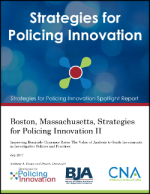
Boston, MA, Site Spotlight (Phase II)
This report highlights the evaluation of Boston's Safe Street Team (SST) strategy during their second Smart Policing Initiative project. The report describes implementation of a strategy to improve homicide clearance rates, and includes a process and impact evaluation of the strategy on homicide clearance rates in Boston.

Glendale, AZ, Site Spotlight (Phase I)
This report highlights the Glendale, AZ Smart Policing Initiative to address convenience store thefts using a problem-solving model. The report describes the policing strategies implemented, research and implementation outcomes, and lessons learned. The Site Spotlight concludes with insights from Lt. Frank Balkcom and Glendale’s research partner, Dr. Mike White, on lessons learned from police officers and researchers alike.
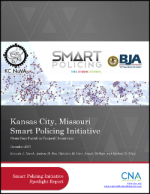
Kansas City, MO, Site Spotlight
This report highlights the Kansas City, MO Smart Policing Initiative targeting violent crime. The report describes the strategies implemented during the SPI, including targeted foot patrols and the "Pulling Levers" focused deterrence strategy, the effects of these crime reduction initiatives, and lessons learned from the site.
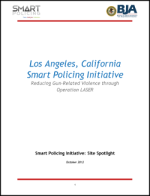
Los Angeles, CA, Site Spotlight
This report highlights the Los Angeles, CA Smart Policing Initiative focusing on gun-related violence. The report describes the site's implementation of Operation Los Angeles’ Strategic Extraction and Restoration Program (Operation LASER) using the SARA problem-solving model and hot spot policing strategies. The report offers an impact analysis of Operation LASER and lessons learned from the SPI site.

Lowell, MA, Site Spotlight (Phase II)
This report highlights the Lowell, MA, Smart Policing Initiative addressing drug-related property crimes. The report describes implementation of a problem-oriented and hot spot policing model, results from the impact assessment, and lessons learned in using non-traditional data in the problem analysis process.
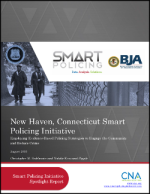
New Haven, CT, Site Spotlight
This report highlights the New Haven, CT Smart Policing Initiative which used enhanced foot patrols, community engagement, and a modified problem-oriented policing technique to address rising violent and gun-related crime rates. The report describes the strategies implemented, impacts on violent crime, and lessons learned within the department on successful implementation.
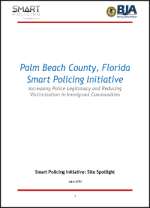
Palm Beach County, FL, Site Spotlight
This report highlights the Palm Beach County Smart Policing Initiative to prevent crime, including robbery, and improve police-community relations. The report describes strategies implemented at the site, including hiring a community liaison and dedicating a robbery detective to work with the liaison, and early results from the program on robbery reduction and improvements community trust.

Philadelphia, PA, Site Spotlight
This report highlights the Philadelphia, PA Smart Policing Initiative studying the effectiveness of certain policing strategies in high crime hot spots. The report describes implementation and effects of foot patrol, problem-oriented policing, and offender-focused policing strategies in 81 hot spots in the city. The report also comments on the consequences of variation in effectiveness of the strategies.
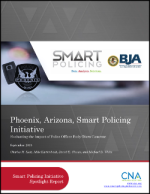
Phoenix, AZ, Site Spotlight
This report highlights the Phoenix, AZ, Smart Policing Initiative study on the effect and perceptions of officers' body-worn cameras. The report describes deployment of cameras to one squad and an evaluation of camera activation compliance, officers' perceptions of the wearability and utility of body-worn cameras, impact on officers’ job performance, impact on public compliance and cooperation, impact on officers' accountability, and impact on the processing and outcomes of domestic violence cases.

Reno, NV, Site Spotlight
This report highlights the Reno, NV, Smart Policing Initiative addressing prescription drug abuse. The report describes strategies for educating people on prescription drug abuse, preventing such abuse, reducing the supply of illicit drugs, and suppressing abuse through law enforcement.
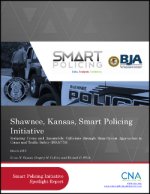
Shawnee, KS, Site Spotlight
This report highlights the Shawnee, KS Smart Policing Initiative which implemented a model, Data-Driven Approaches to Crime and Traffic Safety (DDACTS). The report describes the implementation of the DDACTS model and a three-pronged evaluation to examine the implementation and impact of the model, including effects on officer "buy-in," results of community surveys, and trends in crime.
